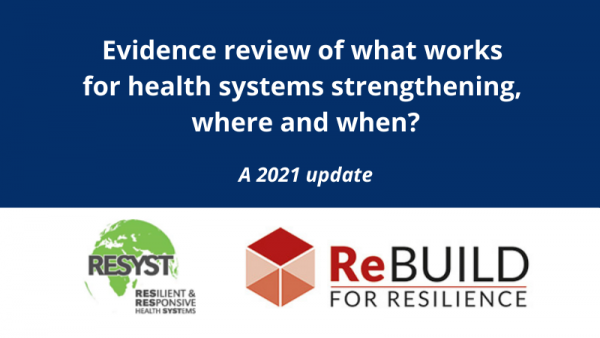
Evidence review of what works for health systems strengthening, where and when?
This report, Evidence review of what works for health systems strengthening, where and when?, was commissioned by the UK government’s Foreign, Commonwealth and Development Office (FCDO) from the ReBUILD for Resilience and ReSYST research consortia [opens in a new window]. It is a 2021 update of a health systems strengthening evidence review originally undertaken for the office in 2019 (see ‘Further information’ below).
Like the earlier version, this 2021 review had three main objectives:
1. To support strategic planning work within FCDO by identifying evidence on effective health systems strengthening approaches in different contexts;
2. To support advocacy activities by helping FCDO Advisers make the case for investment in HSS as a route to achieving improvements in health; and
3. To help FCDO Health Advisers make sense of the large volume of evidence on HSS and sign-post health advisers to key pieces of evidence on health systems strengthening.
It provides a rapid evidence synthesis response to the following:
1. What do we know about how health systems strengthening (HSS) interventions work to improve health and health system outcomes, where, for whom, when and at what cost?
2. What is the evidence that HSS interventions lead to (or contribute to) improvements in health and other outcomes? How robust is this evidence? How can we compare scale and cost across different populations?
3. What is the evidence on the relationship between inputs into individual building blocks of the system and the functioning of the system as a whole?
4. What is the evidence on specific health systems strengthening approaches needed in particular contexts, e.g. conflict-affected countries or those transitioning from aid?
5. What are the key gaps in evidence on HSS programming across contexts?
After explaining the review’s methods, the authors start by discussing definitions of the core concept of HSS and issues relating to evidence on its effectiveness. They then rapidly review studies on a range of interventions across health system pillars and conclude by returning to the original questions.
Contributors
Contributors included: Sophie Witter, Natasha Palmer, Dina Balabanova, Sandra Mounier-Jack, Tim Martineau, Anna Klicpera, Krista Kruja, Charity Jensen, Miguel Pugliese Garcia and Lucy Gilson.
Further information
A summary of this report was presented to FCDO in March 2021. A pdf of the presentation can be downloaded here or the slides viewed below.
Also, this report is an update of an 2019 review of the same name and purpose. That report and the associated paper and presentation are available here:
- The 2019 version of the report can be read here.
- Paper: Health system strengthening – Reflections on its meaning, assessment and our state of knowledge
- Presentation given to DFID in July 2019. A video of the presentation, an interview with Sophie Witter and the slides alone are available here.